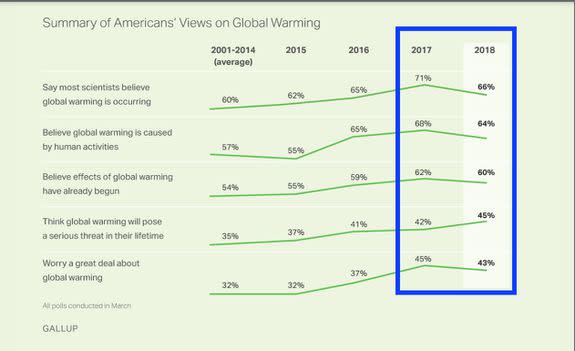Climate change is a more partisan issue than ever, and Donald Trump is to blame

The Trump administration's rollbacks of crucial climate change policies, from the intended pullout from the Paris Agreement to the scuttled Clean Power Plan, have earned most of the media attention and scorn from environmentalists.
However, the ignorant climate science statements espoused by top federal officials, from the president to the administrator of the Environmental Protection Agency (EPA) to the secretary of Energy, and many others is having a corrosive effect on Americans' understanding of climate science.
Recent public opinion polling clearly shows that Americans are more divided now than they were a year ago on the causes of global warming, its seriousness, and the urgency of taking action.
SEE ALSO: Shell knew truth of global warming in 1980s; foresaw a Hurricane Sandy scenario
While the majority of Americans still believe that global warming is caused by human activities, and that the effects of it have already begun, it's clear that the building drumbeat of flat out incorrect statements about climate science uttered by top officials is molding public opinion in a way that makes it harder for action to be taken on climate change.
A recent Gallup poll, for example, found that Republicans and independents have become more skeptical in their views on climate change, while Democrats have become even more convinced of the need to urgently reduce greenhouse gas emissions to curb global warming.

Image: gallup.
According to the Gallup poll, which is consistent with other public opinion surveys, majorities of Americans say that most scientists think global warming is taking place (66 percent), that it is caused by human activities (64 percent), and that its effects have already begun (60 percent).
However, there's a hardening of the partisan divisions that's occurred under Trump.
Gallup's annual survey on the environment, conducted during the first week of March, found that Americans are more divided than ever on climate change.

"President Donald Trump, who has called global warming a "hoax," may have contributed to this widening divide by reversing a number of government actions to address the issue," Gallup wrote in their online analysis accompanying the poll results.
Trump and his cabinet officials have also frequently misstated the scientific consensus on global warming in ways that cast doubt on the seriousness of the problem or even its existence.
For example, Trump does not seem to know the difference between weather and climate, using a December cold snap to rebut evidence of global warming.
In the East, it could be the COLDEST New Year’s Eve on record. Perhaps we could use a little bit of that good old Global Warming that our Country, but not other countries, was going to pay TRILLIONS OF DOLLARS to protect against. Bundle up!
— Donald J. Trump (@realDonaldTrump) December 29, 2017
Scott Pruitt, the embattled EPA administrator, has openly questioned the scientifically solid link between increasing amounts of carbon dioxide in the air and global warming, telling CNBC last year that this long-lived greenhouse gas is not a "primary contributor" to global warming. (This is at odds with scientific knowledge documented in the 18th Century.)
"I think that measuring with precision human activity on the climate is something very challenging to do and there's tremendous disagreement about the degree of impact, so no, I would not agree that it's a primary contributor to the global warming that we see," Pruitt said.
The Gallup poll found that while 82 percent of Democrats think global warming has already begun, only 34 percent of Republicans agree. In fact, 32 percent of Republicans said climate change effects will "never happen."
In addition, about 69 percent of Republicans said news reports exaggerate the seriousness of global warming, but 64 percent of Democrats say the seriousness of global warming is underestimated.
Even though the vast majority of climate scientists know that global warming is human-caused and already occurring, going as far as saying in a 2017 government report that there is no natural explanation for the global warming we've seen in recent decades.
The report, published by the Trump administration but released with little fanfare and ignored by Pruitt and others, stated:
Yet despite such scientific assessments, a sizable 63 percent of Republicans think climate change is mostly due to natural causes, according to the Gallup poll.
Climate scientists understand that the use of the bully pulpit to espouse unscientific nonsense does not come without consequences.
In a Twitter thread on Friday, Texas Tech University climate researcher Katharine Hayhoe linked officials' statements with public opinion trends and a slowing down of urgently needed actions to reduce greenhouse gas emissions if we are to avoid the worst global warming impacts.
Over the last year, we've seen an unprecedented level of obfuscation, rejection, and outright denial from politicians and both elected and appointed leaders. So it is no surprise that the opinions of those who support and endorse them have followed suit. No surprise at all.
— Katharine Hayhoe (@KHayhoe) April 6, 2018
The cost of rejecting science is that our society is making decisions based on faulty & flawed information. We will be unprepared: for rising sea levels, stronger storms & droughts, increasing risks to our health, our economy, even national security. And we will pay the price.
— Katharine Hayhoe (@KHayhoe) April 6, 2018
Tony Leiserowitz, senior research scientist and director of the Yale Program on Climate Change Communication, said up until the 2016 election, recognition of climate change as a real, important issue was growing within the Republican Party. But that has changed dramatically in the last year, which he attributes largely to cues coming from the party's leaders.
“It’s the power of political elite cues,” he said, noting in an interview that partisans “... tend to listen to and follow the lead of what they hear from their political leaders.”
After the rise of the Tea Party and Trump, Leiserowitz said, his polling group has also found a steep drop in Republican recognition of the scientific consensus on climate change.
He said the Republicans made a “huge lurch to this new position that climate change is a hoax.”
“They climbed way out not just a limb but the farthest twig of a limb.”
He called his own group's findings and Gallup's conclusions evidence of the "Trump Effect" when it comes to climate change in particular.
“Groups are getting farther and farther split apart,” Leiserowitz said.
Lasting ramifications
Climate science studies couldn't be more clear in showing that we're running out of time to make the emissions cuts that would avoid sharp rises in sea levels, more frequent and severe heat waves, and other extreme weather events.
We may look back one day at the anti-science rhetoric of the past 15 months and realize this was the time when the fight for a so-called safe amount of climate change was lost, given that the U.S. is the world's second-largest emitter of greenhouse gases.
Rolling back climate actions while also casting doubt on climate science has far-reaching consequences that could reverberate across generations, given that one molecule of carbon dioxide can remain in the air for at least 1,000 years.
Think about that the next time the president tweets about a cold day as if it renders the mainstream scientific consensus on global warming moot, or the Energy secretary says that we should be relying more on fossil fuels and less on wind and solar power.
WATCH: The lake that reminds them of home


